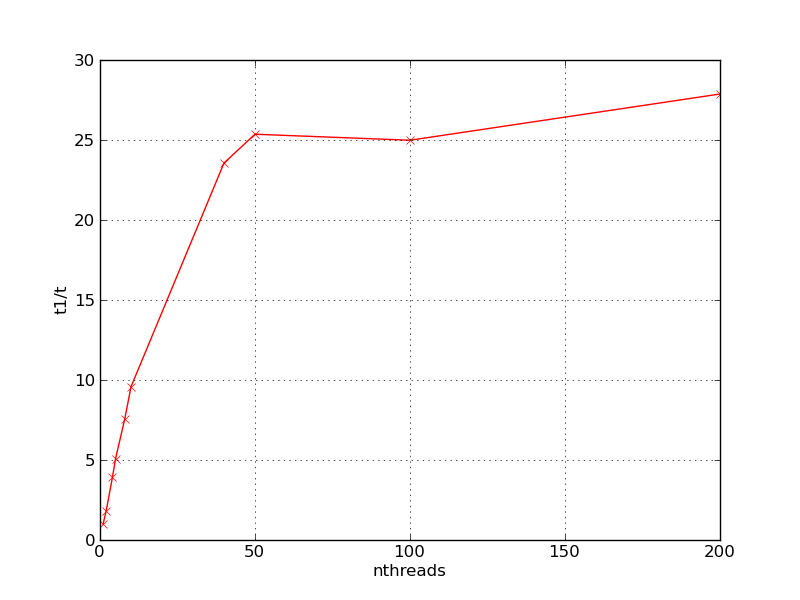I am solving linear advection equation in order to learn parallel programming. I am running this code on Xeon Phi co processor. Below is a plot of how it scales up with increasing number of threads. I am still in learning process and this is my first "parallel" code. I am also not very familiar with architecture specific optimization.
Comments on how to improve the performance of this code and what other stuff should I look into will be great. Also link for writeup or further tutorials to follow will be really helpful.
The plot is for nx=100000.

#include <stdlib.h>
#include <stdio.h>
#include <omp.h>
#include <sys/time.h>
#include <unistd.h>
int64_t TimeInMicros() {
struct timeval tv;
gettimeofday(&tv, NULL);
return tv.tv_sec*1000000 + tv.tv_usec;
}
struct Grid{
int nx;
double *u, *f, *res;
double a, cfl, dx, tf;
};
struct ThreadData{
int tid, maxthreads;
struct Grid *grid;
};
void *solver(void *args){
struct ThreadData *td = (struct ThreadData *)args;
int tid = td->tid;
struct Grid *grid = td->grid;
double *u = grid->u;
double *f = grid->f;
double *res = grid->res;
int nx = grid->nx;
double tf = grid->tf;
double cfl = grid->cfl;
double a = grid->a;
double dx = grid->dx;
double dt = cfl*dx/a;
double t = 0.0;
int chunk = nx/(td->maxthreads);
int start = tid*chunk;
int rc;
while(t < tf){
// sync here
#pragma omp barrier
if(start == 0){
f[start+1:chunk] = a*u[start:chunk];
}
else{
f[start:chunk+1] = a*u[start-1:chunk+1];
}
// sync here
#pragma omp barrier
if(start == 0){
f[start] = f[nx-1];
}
res[start:chunk] = -(f[start+1:chunk] - f[start:chunk])/dx;
u[start:chunk] += res[start:chunk]*dt;
t+=dt;
}
return NULL;
}
int main(int argc, char*argv[]){
int nx=atoi(argv[1]);
int nthreads=atoi(argv[2]);
if(nx%nthreads != 0){
printf("ERROR: Number of cells should be integral multiple of number of threads \n");
exit(1);
}
double *u = new double[nx]();
double *res = new double[nx]();
double *f = new double[nx+1]();
double dx = 1.0/nx;
double cfl = 0.9;
double a = 1.0;
double tf = 1.0;
int i;
// initialize
u[0:nx] = 0.0;
u[nx/4:nx/2] = 1.0;
f[0:nx+1] = 0.0;
res[0:nx] = 0.0;
struct Grid grid;
grid.nx = nx;
grid.a = a;
grid.cfl = cfl;
grid.dx = dx;
grid.u = u;
grid.res = res;
grid.f = f;
grid.tf = tf;
int64_t t1 = TimeInMicros();
#pragma omp parallel num_threads(nthreads)
{
struct ThreadData td;
td.tid = omp_get_thread_num();
td.grid = &grid;
td.maxthreads = omp_get_num_threads();
if(nthreads != omp_get_num_threads()) {
if(td.tid == 0) {
printf("ERROR: Number of cells should be integral multiple of number of threads \n");
exit(-1);
}
}
else {
solver(&td);
}
}
int64_t t2 = TimeInMicros();
printf("Execution time: %.10f\n", (t2-t1)*1e-6);
FILE * outfile;
outfile = fopen("results.txt", "w+");
for(i = 0; i < nx; i++){
fprintf(outfile, "%.10f %.10f\n", i*dx, grid.u[i]);
}
fclose(outfile);
delete[] u;
delete[] res;
delete[] f;
}
